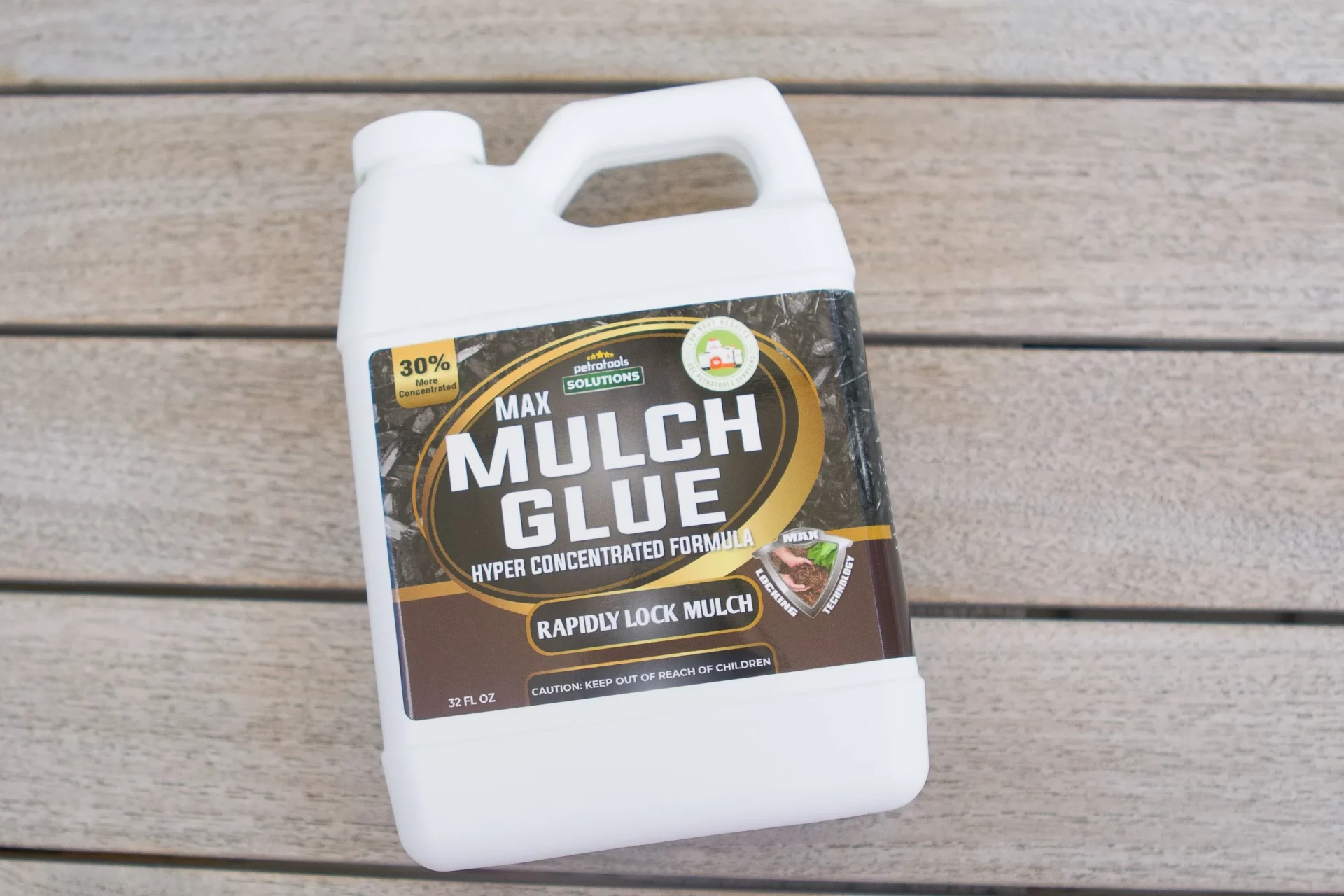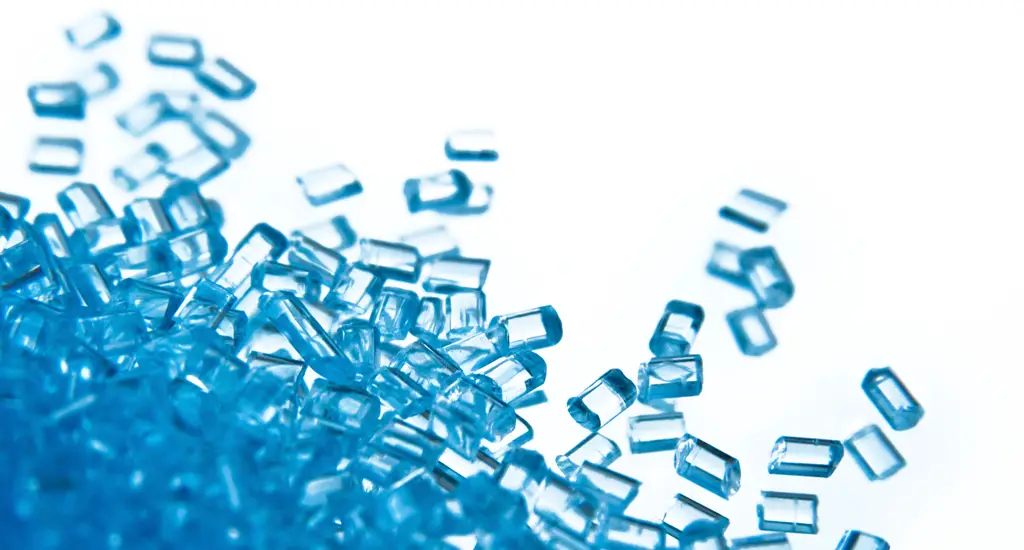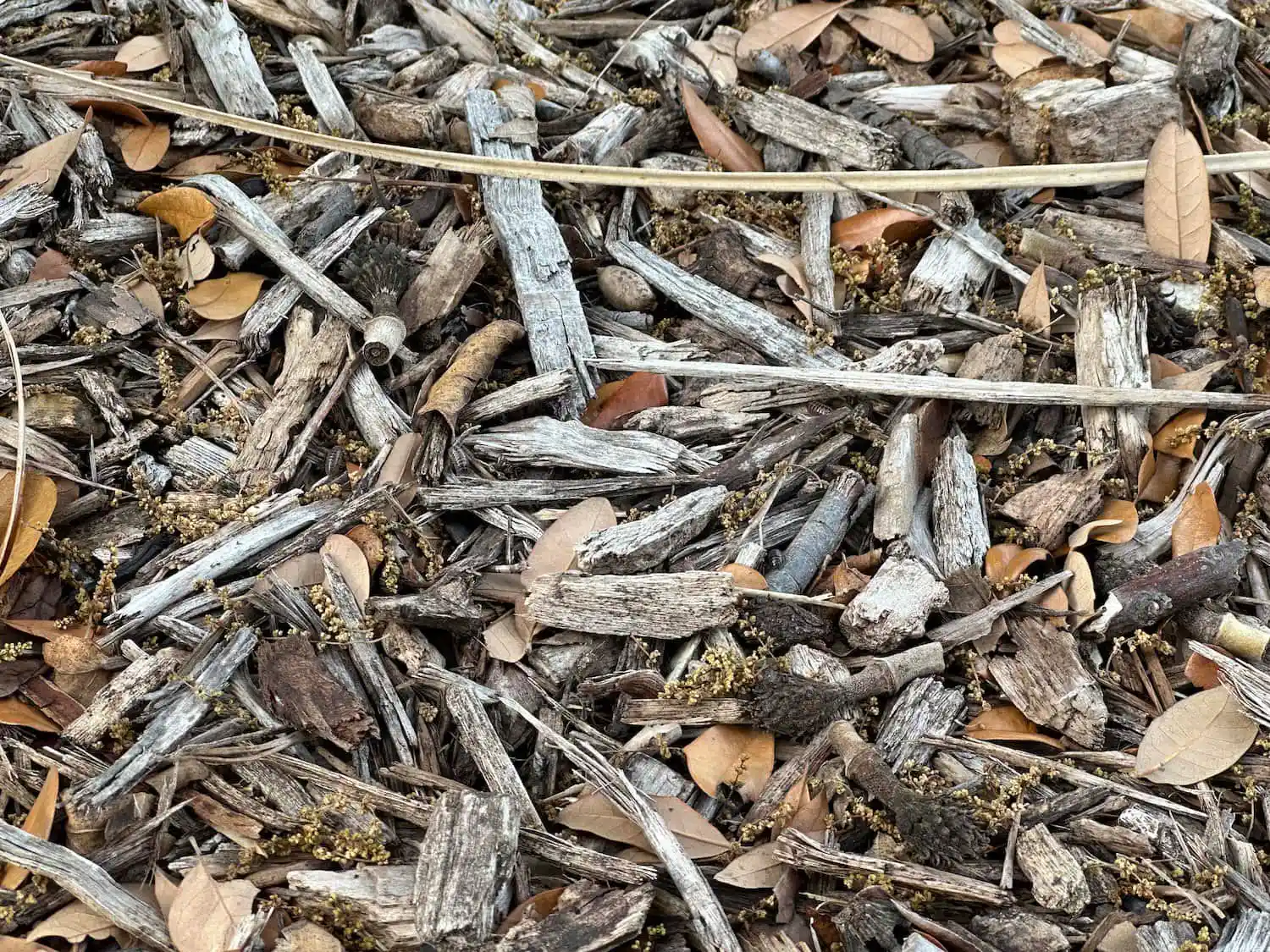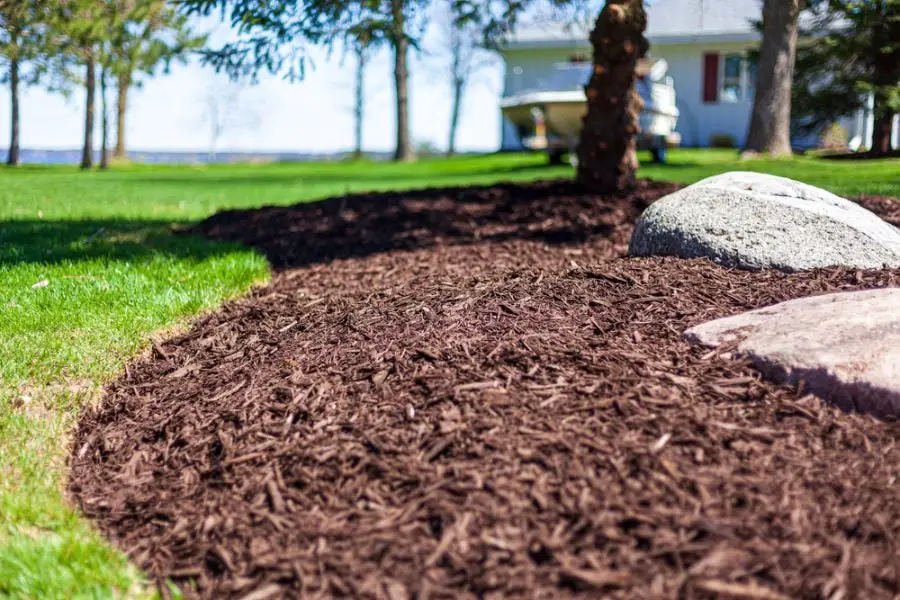Mulch glue is a gardening glue, primarily used to stick mulch, pebbles, bark, and chips in place.
Mulches are used to lock in soil moisture and prevent soil erosion.
Mulch glue is temporary and can last up to 12 months.
Mulch glue is used to retain soil quality and does not affect soil fertility.
Moreover, it is water-permeable and allows water to move past the barrier.
Tired of constantly having to deal with mulch blowing away or shifting around in your garden beds? Our mulch glue is the perfect solution! Our revolutionary product helps keep your mulch in place, so you can spend less time worrying about your garden and more time enjoying it.🌱 pic.twitter.com/ghHc0HXVwh
— PetraMax (@petramax_) April 28, 2023
Mulch glue has low environmental impacts because it is non-toxic and has a non-leaching property.
It is recommended to keep the kids and pets away from the product until it is completely dried.
What Is Mulch Glue?

Mulch is an organic or inorganic barrier that helps in soil prevention and slows down evaporation.
In gardens, the area around plants or trees is covered by an organic mulch that includes leaves, tree bark, gravel, or stone.
Sometimes an inorganic mulch consisting of rubber or plastic is also used.
To hold these materials in place, an adhesive is required and a non-toxic mulch glue is sprayed onto the surface.
The mulching material like compost, sand, gravel, and wood chips is then placed over it.
This helps in locking materials in their place and prevents pets from scratching mulch. Furthermore, blowing away leaves from your yard becomes easy.
Chemical Composition Of Mulch Glue
To discuss whether mulch glue is good or bad for the environment, one must take a look at the chemical makeup of mulch glue.
For making an eco-conscious purchase, choosing a non-toxic mulch glue has to be our top priority.
Mulch glue is synthetic, i.e., made of plastic polymers.

Most of the mulch glues present in the market come with a tagline ‘last up to 12 months’ which means it does biodegrade but takes time.
But plastic polymers release no toxins into the environment. Furthermore, they do not have a leaching effect.
The chemical composition of mulch glue does not contain any harmful or toxic materials and it is safe to use.
Environmental Impacts Of Mulch Glue

We all have been using glue since childhood and some kids might have eaten it too.
But mulch glue is different from regular glue because it is super adhesive.
It is crucial to opt for options that are sustainable and cause no harm to the environment.
Mulch glue is widely used in home gardens and parks.
The application of mulch glue does not release toxic chemicals or fumes.
Moreover, it does not have a leaching effect, which means it cannot seep through the soil, however, it lets water pass through it.
Mulch glue does not have a burning or poisoning effect when it comes in contact with human skin.
Since mulch glue is diluted with water, prior to application, it has no harmful impacts on human beings and pets.
Mulch glue if accidentally sprayed on flowering plants or other herbs or shrubs, causes no damage to the plants.
Pros of Mulch Glue
Mulch glue is used as an adhesive on rock, sand, gravel, and compostable material. There are several advantages of using mulch glue:
It holds the mulch in place and prevents soil from erosion and mulch dispersal as a result of rain, wind or pet intrusion.
Mulch glue is water-permeable, which means it allows water to seep down the surface of the soil.
Mulch glue is porous, if the mulch material is organic, the water-soluble minerals will also trickle down the mulch glue and enrich the soil with nutrients.
I learned the other day that there’s something called “Mulch Glue.” So if you have a flower bed where the mulch drains off after a rain, you can spray this stuff on it and it won’t move. Allegedly OK for plants.
— Victory or Death 🇺🇸 (@IncognitoMeems) April 6, 2023
Mulch glue comes with an easy application and can withstand all kinds of weather conditions.
Mulch glue when applied does not release toxic chemicals into the atmosphere.
Mulch glue dries quickly and kids and pets can play on the mulch area after 24-48 hours of mulch glue application.
Cons of Mulch Glue
To balance out the rule of nature, there are some disadvantages of using mulch glue.
Mulch glue is extremely adhesive which means you cannot move your mulch material frequently.
Mulch glue is porous and does not help in weed control unless an inorganic plastic layer is placed as a mulch.
Since mulch is fixed, there is no rotation of mulch material, especially in the case of organic mulch (compost material)
Due to insufficient oxygen supply to the lower layer, an anaerobic condition occurs, giving off a pungent smell and releasing a little number of phytotoxins.
Increased nitrogen production can sometimes lead to plant destruction.
Recommendations
Mulch Glue causes no serious harm to the environment and poses no threat to public health but there are a few recommendations that can save you time and energy.
Well that’s one way to keep from losing the mulch. Glue it down. pic.twitter.com/yDQKyrBa1Z
— Dr Theosib, CPU expert (@theosib2) March 21, 2021
1. It is advised to choose your mulch material wisely.
2. When spraying mulch glue, make sure to skip some areas to allow air passages.
3. It is best suited for garden rocky paths and areas that require leaf blowers.
4. If mulch glue gets in contact with your hands, clothes, or hair, simply wash it off with water and soap.
5. After every application, wash the mulching machine too.
6. For heavy human and animal traffic, apply a thick coating of glue to ensure strong adhesion.
7. Do not let kids or pets get near the mulch glue when it is wet.
8. Avoid spraying mulch glue in the rainy season as it won’t dry on time.
Conclusion
Mulch glue does not release any toxins into the air and does not have a leaching effect
When it rains, the water is not accumulated in the form of a pool but passes through mulch glue.
Water soluble nutrients present in the mulching material also pass through the mulch glue, enriching the soil with minerals.
The application of mulch glue is easy and there is no odor or fume production.
The chemical composition of mulch glue is polymer plastic which biodegrades over time and poses no serious threat to the surrounding environment.
If accidentally sprayed on plants or shrubs, mulch glue has zero effect on them.
Similarly, if human skin gets in contact with mulch glue, there is no poisoning of toxins.
It is henceforth concluded that mulch glue is not bad for the environment.







